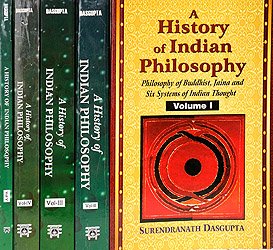A History of Indian Philosophy Volume 1
by Surendranath Dasgupta | 1922 | 212,082 words | ISBN-13: 9788120804081
This page describes the philosophy of the world-soul: a concept having historical value dating from ancient India. This is the eleventh part in the series called the “the earlier upanishads (700 b.c.— 600 b.c.)”, originally composed by Surendranath Dasgupta in the early 20th century.
Part 11 - The World-Soul
The conception of a world-soul related to the universe as the soul of man to his body is found for the first time in R.V. X. 121. 1, where he is said to have sprung forth as the firstborn of creation from the primeval waters. This being has twice been referred to in the Svetāśvatara, in III. 4 and IV. 12. It is indeed very strange that this being is not referred to in any of the earlier Upaniṣads. In the two passages in which he has been spoken of, his mythical character is apparent. He is regarded as one of the earlier products in the process of cosmic creation, but his importance from the point of view of the development of the theory of Brahman or Atman is almost nothing. The fact that neither the Puruṣa, nor the Viśvakarma, nor the Hiraṇyagarbha played an important part in the earlier development of the Upaniṣads leads me to think that the Upaniṣad doctrines were not directly developed from the monotheistic tendencies of the later Ṛg-Veda speculations. The passages in Śvetāśvatara clearly show how from the supreme eminence that he had in R.V. X. 121, Hiraṇyagarbha had been brought to the level of one of the created beings.
Deussen in explaining the philosophical significance of the Hiraṇyagarbha doctrine of the Upaniṣads says that the
“entire objective universe is possible only in so far as it is sustained by a knowing subject. This subject as a sustainer of the objective universe is manifested in all individual objects but is by no means identical with them. For the individual objects pass away but the objective universe continues to exist without them; there exists therefore the eternal knowing subject also (hiranyagarbka) by whom it is sustained.
Space and time are derived from this subject. It is itself accordingly not in space and does not belong to time, and therefore from an empirical point of view it is in general non-existent; it has no empirical but only a metaphysical reality[1].”
This however seems to me to be wholly irrelevant, since the Hiraṇyagarbha doctrine cannot be supposed to have any philosophical importance in the Upaniṣads.
Footnotes and references:
[1]:
Deussen’s Philosophy of the Upaṇiṣads, p. 201.
